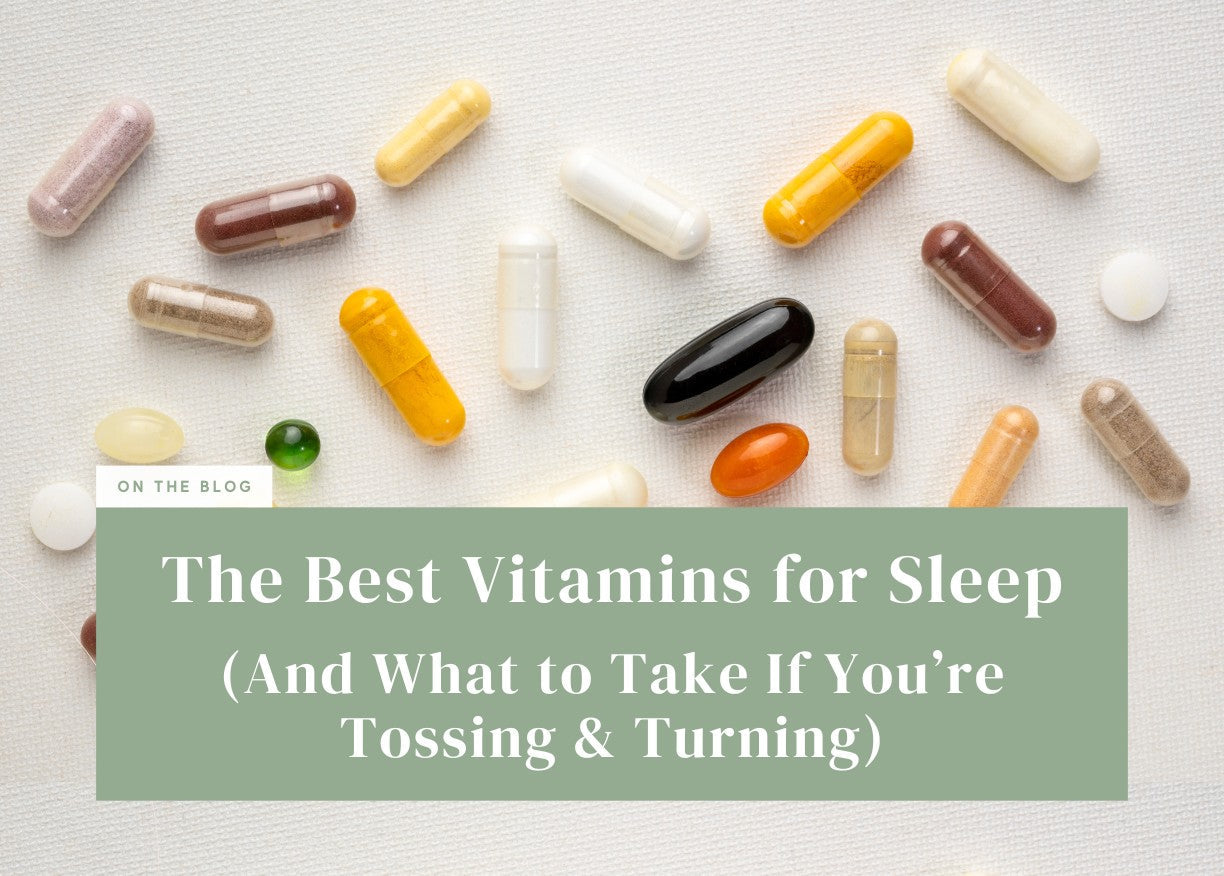The Best Vitamins for Sleep (And What to Take If You’re Tossing & Turning)
You're doing everything right.
Going to bed at the same time. Avoiding caffeine. Keeping the room cool and dark.
And yet—you’re still staring at the ceiling, wide awake.
If this sounds familiar, the problem might be deeper than your bedtime routine.
It could be a nutrient issue.
Vitamins and minerals play a huge role in how well you fall asleep, stay asleep, and feel the next day. And if you're low in even one, it can throw off your whole rhythm.
Let’s break down the most important ones—and how to naturally support your sleep from the inside out.
1. Magnesium: The Master Mineral of Sleep

Magnesium helps your brain relax by regulating GABA, a neurotransmitter that promotes calm. It also helps muscles relax and supports deeper sleep.
🚨 Signs you might be low:
-
Restlessness
-
Trouble falling or staying asleep
-
Muscle cramps or tension
-
Anxiety at night
✅ Where to get it:
-
Leafy greens, pumpkin seeds, almonds, dark chocolate
-
Magnesium glycinate or citrate supplements before bed
2. Vitamin D: More Than Just Sunshine

Vitamin D isn’t just for bones. It also influences melatonin production—the hormone that tells your body it’s time to sleep.
🚨 Signs you might be low:
-
Daytime sleepiness
-
Depression or low mood
-
Trouble falling asleep
✅ Where to get it:
-
Sunshine (15–30 mins daily)
-
Fatty fish, egg yolks, fortified foods
-
D3 supplements if you're not getting enough sun
🔍 Source: Sleep Medicine Reviews
3. B Vitamins: Brain and Body Balance

B vitamins—especially B6, B12, and folate—help regulate sleep by supporting brain health, energy metabolism, and serotonin production.
🚨 Signs of deficiency:
-
Vivid dreams or nightmares
-
Mood swings
-
Sleep disturbances
✅ Where to get it:
-
Whole grains, bananas, leafy greens, eggs, legumes
-
A quality B-complex supplement (but avoid high doses of B12 too late in the day—it can be stimulating)
🔍 Source: Nutritional Neuroscience
4. Melatonin: The Sleep Hormone (But Use With Care)

Melatonin isn’t technically a vitamin, but it’s worth mentioning.
Your body produces it naturally, and supplements can help regulate your sleep-wake cycle—especially when traveling or resetting your schedule.
🚨 What to know:
-
Less is more (start with 0.3–1 mg)
-
It’s best used short-term, not as a daily fix
-
It doesn’t make you sleepy, it tells your body it’s time to sleep
✅ Try it when adjusting to a new time zone, or for occasional sleep disruptions.
🔍 Source: Sleep Foundation
5. Iron: The Hidden Sleep Disruptor

Low iron levels are linked to restless leg syndrome, which can severely affect sleep quality.
🚨 Signs you might be low:
-
Waking up tired
-
Cold hands and feet
-
Cravings for ice or non-foods
-
Restless legs at night
✅ Where to get it:
-
Red meat, lentils, spinach, iron-fortified cereals
-
Iron supplements only if confirmed by a blood test
Bonus Tip: Absorb These Better With Real Sleep
Even with the right vitamins, bad sleep habits or poor bedding can undo everything.
That’s why it’s essential to pair nutritional support with a healthy sleep environment.
At Sweet Zzz, our Honey Hybrid Organic Mattress helps reduce pressure, overheating, and tossing—so your body can actually use those nutrients to rest and repair.
Pair it with our plant-based pillow and bamboo sheets for the ultimate nighttime combo: comfort + calm.
Final Thoughts: Sleep Starts Long Before Bedtime
You don’t have to pop a pill for every problem—but understanding how vitamins affect your sleep is a smart move.
Because sometimes, what feels like “insomnia” is really your body asking for more of what it’s missing.





